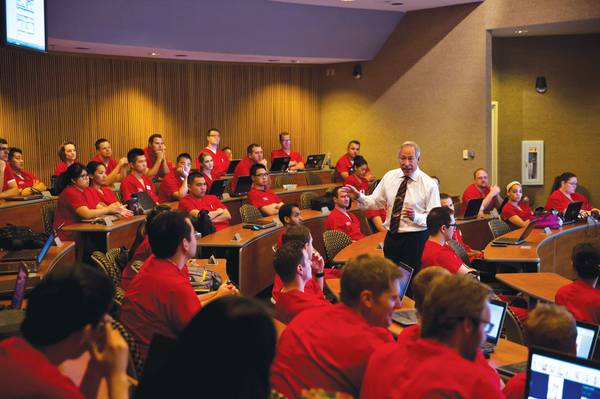“Whoops.”
That’s the last thing you want to hear from your dentist as he hovers over you. Unfortunately, it’s not that uncommon.
“Dentists say silly stuff all the time,” Dr. Phillip Devore said. “They’re trained to drill holes in little things and fill them with stuff, but it’s not enough.”
That’s why Devore, a dentist for 20 years, teaches a communications class at the UNLV School of Dental Medicine designed to train students to do more than just clean teeth and fight cavities. The class touches on topics such as bedside manner and how to communicate with patients, which Devore said dentists aren’t always great at.
Devore, who had offices in Southern California and Summerlin, taught part-time at the dental school for 11 years before being brought on full time. Now he’s the go-to guy for teaching aspiring dentists how to navigate the trickier parts of the trade.
First, he introduces students to the concept of “outcome-based communication.” That means choosing your words carefully to achieve what you want, be it a favor from a friend or calming an unruly customer. It’s an important skill, he said, because many people, including doctors and dentists, have a tendency to say whatever pops into their head.
“Don’t go into a conversation with your mouth open,” Devore tells students. “Go in with your mouth closed and your brain open. Think about how you want the conversation to turn out.”
During their junior year, UNLV dental students begin seeing patients in the school’s clinic. They need to be able to think on their feet and sometimes break bad news to people in a professional, helpful way.
“Patients often come in asymptomatic,” Devore said. “You could have a raging abscess, and you don’t even know about it. Now, how do I explain to you that you potentially have a life-threatening problem that is unknown to you?”
The key is explaining matters clearly, Devore said. Dentists often assume patients have the same knowledge as they do and steamroll over concerns people might have. That leads to confusion, uncertainty and ultimately buyer’s remorse if the patient feels he or she has been taken advantage of.
Students also tend to put too much emphasis on learning about tools and procedures and ignoring one of the most important aspects of the practice: the patients.
“Patients want to work with someone they like,” Devore said. “Patients are far more likely to accept treatment if they like the doctor.”
That’s where the business side comes in. Students who are good with their hands can easily find work in a dentist’s office, but Devore wants to prepare them for someday owning their own practice.
In a business class, Devore teaches dental students which contracts to sign, how to negotiate a lease and how to read a profit statement. In the communications class, he shows them how to grow a business organically without marketing, simply through effective communication and good dentistry.
Often the advice can be as simple as calling each patient personally after an operation and asking how they are doing.
“The key is to be honest and don’t hide anything,” Devore said. “Parenthetically, it’s also really good for business.”
Devore said the class is rare among dental schools. Most programs focus on traditional academics, although curriculum is gradually changing as educators recognize the value of teaching interpersonal skills.
“I’m trying to teach ‘nice,’ which is hard to do,” Devore said. “Relationships are important to people. It’s what makes them choose to go to a dentist or not.”


Join the Discussion:
Check this out for a full explanation of our conversion to the LiveFyre commenting system and instructions on how to sign up for an account.
Full comments policy